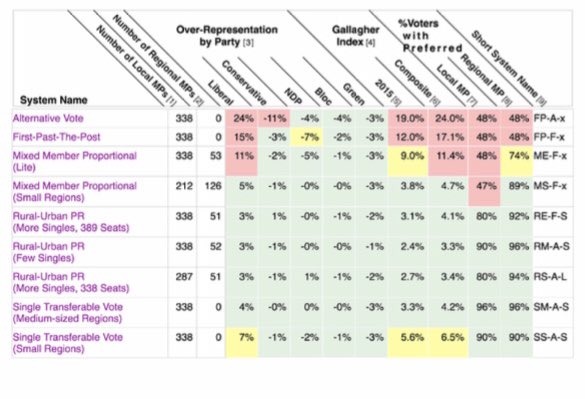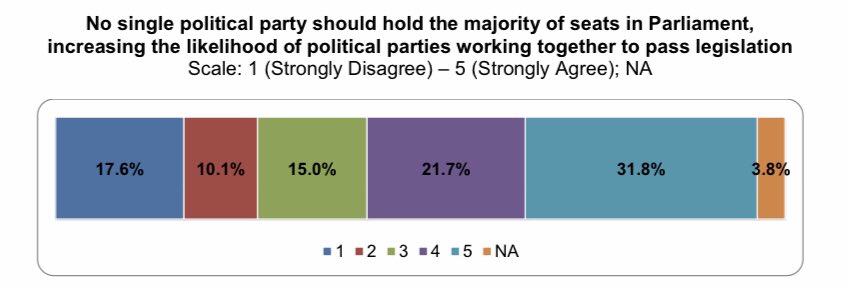"Professor Becker developed the "Gallagher Index Composite" for the Committee& #39;s study, comprised of the & #39;average of the Gallagher Indices for each province and territory, weighted by its number of seats."
"This corrects for a problem in calculating the Gallagher Index for the nation as a whole, which can hide regional disproportionalities such as the significant over-representation of Conservatives in the prairies offsetting the over-representation of Liberals in the Maritimes."
"The most recent FPTP election [2015] had a Gallagher Index score of 12.0% and a Composite Gallagher Index score of 17.1%."
These are bad scores. Remember, 5% is considered an excellent score. It& #39;s also a very achievable score. We& #39;re not even trying.
These are bad scores. Remember, 5% is considered an excellent score. It& #39;s also a very achievable score. We& #39;re not even trying.
Becker calculate the Gallagher Index scores for the 2015 election under FPTP and the potential replacement systems, as follows:
"The primary argument raised in favour of proportional electoral systems is that they more fairly translate votes cast for political parties into seats in the legislature. Indeed, this element was emphasized by various witnesses who testified before the Committee."
"The one thing that the electoral system does is alter the math of the translation of votes into seats. PR systems like STV or MMP or list PR do that much more accurately than first past the post, or alternative vote."
"The more proportional the system, the more equal every vote is in terms of its ability to get someone elected. So the less proportional a system is, the less equal each vote is in terms of its effect on getting somebody elected."
"71.5% of respondents [to the Committee& #39;s online consultation] either strong agreed (59.1%) or agreed (12.4%) with the statement & #39;Canada& #39;s electoral system should ensure that the number of seats held by a party reflects the proportion of votes it received across the country.& #39;"
"When the large majority of experts-not only those who made their presentations to this committee, but also those around the world who have studied democracy and democratic institutions-make up their minds about electoral systems, they come down on the side of some form of PR."
Arend Lijphart - "I& #39;ve gradually come to the conclusion that proportional representation, or PR, is the better option. This has also been the trend among political scientists generally. The empirical evidence is now overwhelmingly strong in support of this conculsion."
"PR is a crucial ingredient in what I have called & #39;consensus democracy& #39;, especially in combination with a parliamentary system of government. It tends to lead to a multi-party system, which in turn tends to lead to coalition cabinets, and also leads to parliaments that..."
"...are stronger and cabinets that are less dominant than in majoritarian systems. In addition, it tends to be associated with a more co-operative system of interest groups."
Ed Broadbent - "The PR system is conducive to more civility in politics...with multi-party systems in which...you& #39;re going to have multiple parties forming governments, the politicians are more civil with each other before elections and during elections."
"53.5% of respondents [to the Committee& #39;s online consultion] either strongly agreed (31.8%) or agreed (21.7%) with the following statement: & #39;Canada& #39;s electoral system should favour the following outcome: no single political party holds the majority of seats in Parliament..."
"...thereby increasing the likelihood that political parties will work together to pass legislation."
Is it me, or is this pretty common sense stuff?
Is it me, or is this pretty common sense stuff?
Only 27.7% disagree. It’s weird having government that ignores the clear wishes of the electorate. This is something that should bother everyone.
"STV aims to achieve a moderate level of proportionality while giving maximum choice to voters and maintaining the local connection between MPs and constituents."
"Mixed electoral systems combine elements of plurality/majority systems with PR...The goal of such systems is to maintain local representation while providing greater overall proportionality in terms of popular vote to seat count in a legislature."
@David_Moscrop (you should follow this guy) - "MMP [mixed-member proportional] allows for direct local representation and lives up to the commitment many Canadians have to fairness understood as a proportional translation of votes into seats."
"A majority of participants who advocated for electoral system change proposed the adoption of an MMP system, suggesting that it maximizes voter choice."
"MMP allows voters to split their vote - meaning vote for a candidate of one party in their riding and vote for another party in the compensatory vote. Such an option would help resolve the & #39;wasted vote& #39; argument that prevails under FPTP."
"In March 2004, the Law Commission of Canada, following a three-year study on electoral reform, recommended Canada move to an MMP electoral system. The Law Commission suggested Canada adopt an MMP system for the following reasons:
•Reduce the discrepancy between a party& #39;s share of seats in the House of Commons and its share of the votes.
•Greater inclusion of new and previously. underrepresented voices, such as small political parties
•To elect a greater number of minority group and women candidates.
•Greater inclusion of new and previously. underrepresented voices, such as small political parties
•To elect a greater number of minority group and women candidates.
•Encourage inter-party cooperation through coalition governments.
•Reduce the disparities in the value of votes in which winning parties are often three to four times more "valuable" than a vote for any other party.
•Reduce the disparities in the value of votes in which winning parties are often three to four times more "valuable" than a vote for any other party.
•Reduce the number of disregarded votes, thus increasing the number of "sincere" votes, as opposed to strategic votes.
•Produce more regionally balanced caucuses.
•Produce more regionally balanced caucuses.

 Read on Twitter
Read on Twitter



